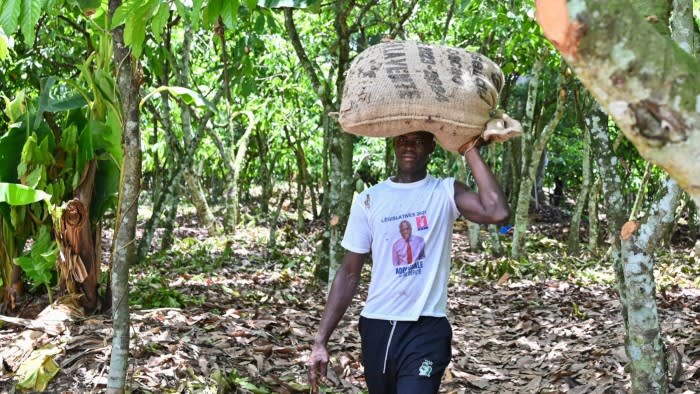
Unlock the Editor’s Digest for free
Roula Khalaf, Editor of the FT, selects her favourite stories in this weekly newsletter.
The price of cocoa hit a record high on Thursday after an industry report said crop failures in west Africa in the first quarter had further exacerbated the global shortage of beans for chocolate.
Futures in London rose as much as 9.6 per cent to an all-time high of £9,477 a tonne, extending the rally since the start of the year as poor harvests in the world’s main growing regions in west Africa have worsened the shortfall.
The number of “grindings” — beans processed by the industry to eventually be turned into chocolate — fell by 2.5 per cent in the first three months of the year compared with the same period last year, according to the European Cocoa Association.
The trade body collates data from 19 cocoa processors and chocolate makers operating in Europe, including Cargill, Barry Callebaut and Olam Food Ingredients (OFI).
Global prices of cocoa have more than doubled this year as investors have fretted that shortfalls will continue. Years of low prices have meant cash-strapped farmers have been unable to invest in improving ageing plantations.

Grinding numbers are used as a measure of demand for chocolate but analysts and industry insiders say current figures reflect the struggle faced by traders, processors and manufacturers to find enough beans.
“Low grind data is a reflection of the fact that there are no beans available; it’s not about demand for chocolate,” said Fuad Mohammed Abubakar, head of the Ghana Cocoa Marketing Company, part of the government-controlled body that sets prices for purchases directly from the farm. In West Africa factories are running at less than 30 per cent of their installed capacity, he added.
The grinding numbers could put further pressure on prices, which in New York surged 7 per cent to $10,800 a tonne on Thursday, up from about $3,000 a tonne this time last year.
Farmers in Ghana and Ivory Coast, who together produce about two-thirds of global cocoa supplies, have faced a double blow of disease outbreaks and adverse weather, driven by climate change and the El Niño weather phenomenon. This has curbed output by more than a quarter in Ivory Coast, the world’s biggest producer.
Both countries have been forced to renegotiate contracts with traders to postpone deliveries, having found themselves short of beans.
Last week the Ghana Cocoa Board, the government regulator that sells beans forward, began talks with traders to roll over to the next season, starting in October, up to 250,000 tonnes of cocoa beans, according to two people with direct knowledge of the talks.
Earlier this month its Ivorian counterpart similarly asked traders to wait for the delivery of 130,000 tonnes.
There are no beans left to be sold, according to Abubakar. “Anyone who calls a broker or an exporter and tells him I’ve got these for you at this moment, it just means that this person is defaulting on another contract because there are no beans to sell,” he said.
In a bid to encourage farmers to invest in their plantations and boost yields, both Ghana and Ivory Coast’s regulators this month increased the set prices paid to farmers. Ivory Coast raised prices by 50 per cent to $2.48 a kilogramme.
Three days later Ghana implemented a similar increase, bringing prices to $2,481 a tonne.
“Longer term, higher cocoa bean prices may encourage planting, which has a three-to-five-year time horizon, to cover global consumption trends which are expected to grow approximately 2 per cent year on year, until 2030,” said Paul Hutchinson, chief strategic trading officer at OFI, one of the world’s biggest soft commodity suppliers.
